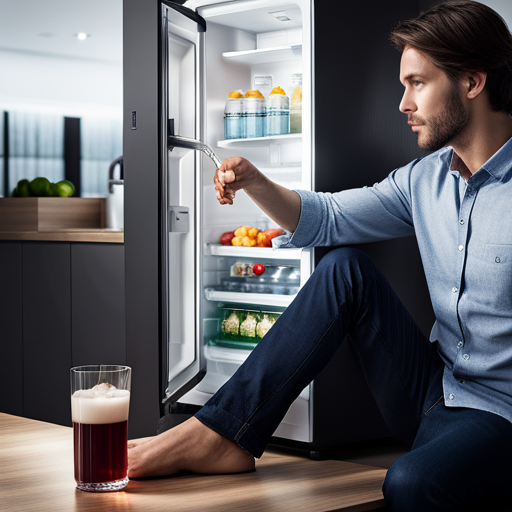Are you the proud owner of a Samsung refrigerator with a water dispenser and ice maker? If so, you may be wondering if it’s necessary to use a water filter. The short answer is no, but it’s worth considering the benefits of using one.
In this article, we’ll explore whether or not you need a water filter for your Samsung fridge, how it works, and tips for maintaining and replacing it.
First, let’s address the question of whether or not you need a water filter. While it’s true that most Samsung fridges don’t require a filter to function properly, using one can have some significant benefits.
Samsung’s carbon filtration system can remove impurities such as chlorine, lead, and sediment from your water, improving its taste and odor. Additionally, using a filter can help prevent mineral buildup in your fridge’s water dispenser and ice maker, which can cause clogs and affect their performance over time.
So, while it’s technically optional, using a water filter is definitely worth considering for the sake of your fridge’s performance and your drinking water’s quality.
Key Takeaways
– Most Samsung fridges don’t need the water filter to keep water and ice flowing.
– Samsung recommends changing the water filter every six months.
– A reverse osmosis system is required for the removal of sodium, nitrates, fluorides, or PFAS chemicals.
– If a home already uses a reverse osmosis system, it may make sense to bypass the water filter system in the fridge.
Do I Need It?
You may be wondering if you need to keep the water filter in your Samsung fridge, but most models don’t actually require it for water and ice to flow properly. However, there are benefits to using the water filter.
Samsung’s carbon water filtration system removes volatile organic compounds, odors, tastes, chlorine, lead, mercury, pesticides, herbicides, and pharmaceuticals. The filter is certified by NSF and its effectiveness can be checked according to their rating system.
If you decide to remove the water filter, there are alternatives that you can consider. For example, a reverse osmosis system with a multi-stage filtration system that includes high-quality carbon filtering is the most effective way to filter water.
If your home already uses a reverse osmosis system, it may make sense to bypass the water filter system in the fridge. Just keep in mind that the filter is recommended to be changed every six months, and a Samsung filter bypass plug is cheap and easy to install if needed.
How It Works
Understand how the carbon filtration system operates in your Samsung refrigerator to effectively maintain the quality of your drinking water and ice.
The system utilizes activated carbon, a natural substance that has a positive charge and attracts impurities with a negative charge.
As water flows through the filter, the activated carbon traps and absorbs volatile organic compounds, odors, tastes, chlorine, lead, mercury, pesticides, herbicides, and pharmaceuticals.
The end result is clean, refreshing water that is free from harmful contaminants.
If you require a more thorough filtration system that removes sodium, nitrates, fluorides, or PFAS chemicals, a reverse osmosis system is necessary.
While a reverse osmosis system can be installed in your home, it is not necessary to operate the water and ice systems in your Samsung fridge.
However, if you already have a reverse osmosis system in place, it may be beneficial to bypass the fridge’s water filter system altogether.
Remember to change your Samsung refrigerator’s water filter every six months for optimal performance and use the built-in bypass system or a bypass plug if necessary.
Maintenance and Replacement
To maintain optimal performance of your refrigerator’s water filtration system, it’s important to regularly replace the filter every six months. This ensures that the carbon filtration system continues to remove volatile organic compounds, odors, tastes, chlorine, lead, mercury, pesticides, herbicides, and pharmaceuticals from your water supply. Over time, the filter lifespan will decrease as it becomes saturated with impurities.
If you notice a decrease in water flow or a change in the taste or odor of your water, it may be time to replace the filter sooner than the recommended six months.
If you’re having trouble with your water filtration system, there are a few troubleshooting steps you can take before replacing the filter. First, check that the water supply to the fridge is turned on and that there are no kinks in the water line. If the water flow is still low, try resetting the water filter light by holding down the appropriate button for a few seconds or consulting your fridge’s manual for instructions.
If these steps don’t resolve the issue, it may be time to replace the filter or seek professional help. Remember, regular maintenance and timely replacement of the water filter will ensure that your Samsung refrigerator continues to provide clean and refreshing water and ice for you and your family.
Conclusion
So, should you use a water filter in your Samsung fridge or not? The answer is ultimately up to you, but it’s important to consider the benefits of using one.
While your fridge may function without a filter, the carbon filtration system in Samsung fridges can remove impurities and improve the taste and quality of your water. Plus, using a filter can help prevent buildup and clogs in your water dispenser and ice maker.
When it comes to maintenance and replacement, it’s important to stay on top of changing your filter regularly. This will ensure that your water is always clean and fresh, and that your fridge runs smoothly.
With these tips and considerations in mind, you can make an informed decision about whether or not to use a water filter in your Samsung fridge.




